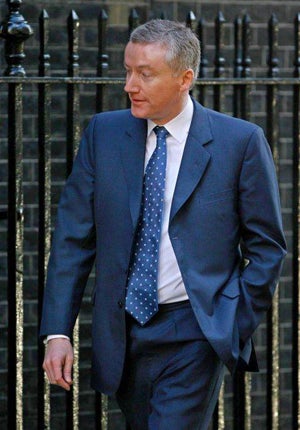Christina Patterson: Let's seize the chance to curb high pay

We have a business," said Sir Fred Goodwin, "that's strong and resilient." He was, he said, feeling "galvanised". And so, it seemed, was his chairman. "I'm a great believer," said Tom McKillop, "in adversity sorting out who the long-term winners will be".
The two men looked surprisingly cheerful for people who had just told shareholders that the bank they ran was £1.5bn in debt. But the people at the top of the Royal Bank of Scotland, at least in the clips shown in Inside the Bank That Ran Out of Money, which was on BBC2 on Monday night, and which you should probably only watch on the BBC iPlayer if your blood pressure's quite low, always seemed to look quite cheerful. It's possible that they didn't in the "morning meetings", which survivors called "the morning beatings", but when they talked to shareholders, they always looked as though things were going very, very well.
"I remain extremely excited by what's in front of us," said a cheery Sloane called Johnny Cameron, who seems to have been in charge of the bank's investment arm. "That interview I did," he said, referring to a nice chat he'd had with someone at ABN Amro, "filled me with enormous confidence". It filled everyone else with confidence, too. Sir Fred announced, in a conference call to senior execs and analysts, that there would be "no scrutiny" of the Dutch bank's books before they bought it, and that they would opt instead for "due diligence light".
When the biggest bank takeover in history went a bit wrong, and RBS had to be bailed out by the British taxpayer, at a cost of £20bn, and about 20,000 shareholders had their life savings wiped out, and millions of people had their pensions pretty much destroyed, Sir Fred retired from the company with a pension pot of £16m.
I'm not absolutely sure that you could call that value for money. I'm not sure that you could call the £500m bonus pot earmarked for the current investment bankers at RBS, which is 84 per cent owned by the taxpayer, value for money either, or the £4.84m package given last year to the chief executive of HSBC, which has just been fined £10.5m for selling long-term investment policies to people who aren't all that likely to stick around. People, in fact, with an average age of 83.
I'm not absolutely sure you could call the £18m paid to John Pluthero, who has just left Cable & Wireless, whose shares have dropped, during his time as chief exec, from 90p to 19.86p, brilliant value either, or the £18 odd million paid to Bart Becht at Reckitt Benckiser, whose share prices have dropped, in the past year, by about 10 per cent. Those of us who know that if you earn 40 grand, you're in the top 10 per cent of the nation's earners, understand, because we keep being told, that if we want to stop our country being sucked down a giant plughole, we need people who create wealth, and these people need to be paid hundreds of times more than the rest of us because – well, we're not entirely sure why, but we know that they do. But we did think that if you were going to create wealth you had to, you know, create wealth. Not shrink it.
Directors' pay in Britain's top businesses, according to a research organisation called Incomes Data Services, rose 50 per cent over the past year. Chief exec pay rose by 43 per cent. Bonuses for "top bosses" went up by 187 per cent. The average pay rise was 3.2 per cent.
No wonder the gap between rich and poor in this country is getting bigger every day. It's now, according to a new report from the OECD, growing faster than in any other rich nation. The share of the nation's wealth held by the top 1 per cent has doubled in 35 years. And people outside that 1 per cent, according to the OECD, are getting angry.
We know the people who are camping outside St Paul's are angry, and we know that the people who closed down schools last week are angry, and we know that the young people who set shops and cars alight in August were angry, and if the people talking, with disguised voices, on Newsnight on Monday night are anything to go by, they still are. But we also know that even shareholders in big business are getting angry – "shareholder pay revolts" at FTSE 100 companies have doubled in the past year – and so is the Governor of the Bank of England. When even people who believe in high pay start talking about the need to "trim dividends", we can probably assume that high pay is too high.
If we can't shame these people into claiming salaries that are a bit more in line with their performance – which are, in fact, more in line with the uber-capitalist system of reward they claim to be so keen on – then we'll have to change some laws. We'll have to, as the High Pay Commission suggests, put ordinary employees on remuneration committees and shake up the cosy clubs that mean that directors at different companies set each other's pay. And we'll have to make sure that companies simplify pay so that a bonus is what everyone who doesn't get one thought it was: a reward for doing something well.
Putting some curbs on pay at the top won't solve the financial crisis, or shrink the deficit, or even create jobs. But it will send a message from the 99.9 to the 0.1 per cent that even those of us who don't have all that much money can tell when it's being chucked away.
Join our commenting forum
Join thought-provoking conversations, follow other Independent readers and see their replies
Comments
Bookmark popover
Removed from bookmarks